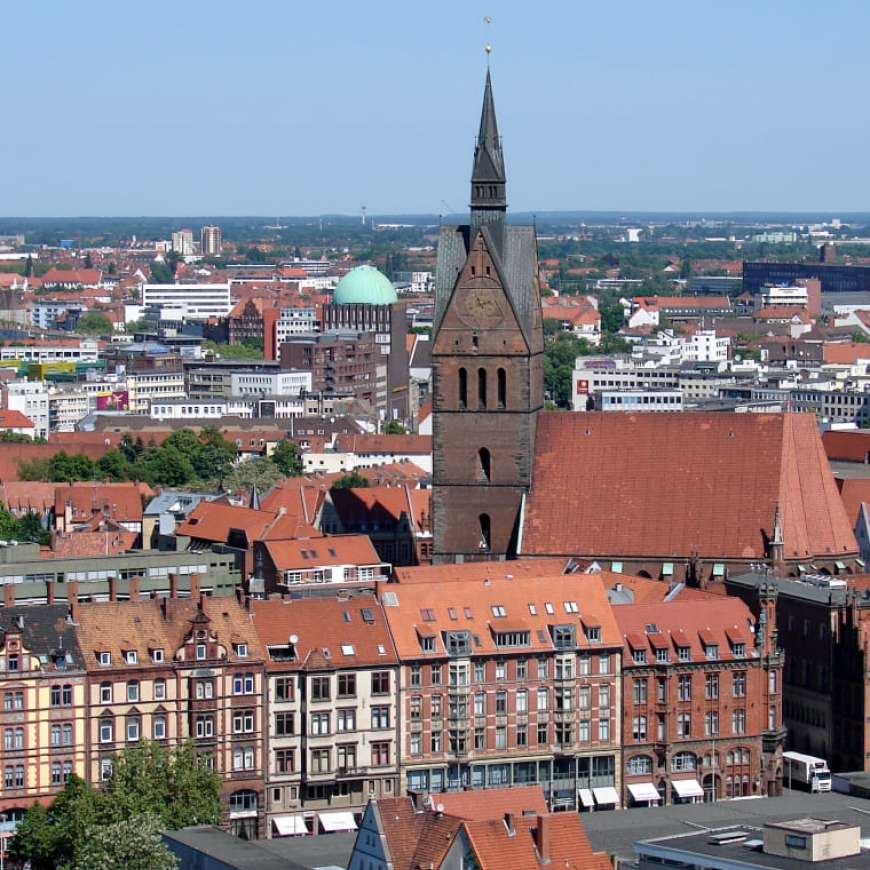Hanover

Hanover is the capital and largest city of Lower Saxony, Germany, and the fourth largest city in northern Germany, after Berlin, Hamburg, and Bremen.
Founded in the Middle Ages on the east bank of the Leine River, Hanover's original name, Honovere, likely means "high (river) shore." Originally a small village of ferrymen and fishermen, it grew into a significant city by the 13th century. Hanover served as a gateway to the Rhine, Ruhr, and Saar river valleys, along with their industrial hubs that developed to the southwest. Additionally, it facilitated overland traffic through the plains regions to the east and north, bypassing the Harz mountains and connecting the Low Countries with Saxony or Thuringia. The trade in iron and silver from the northern Harz mountains during the 14th century industrialization boosted the city's importance.
Hanover is home to about 5,500 buildings of historical value. The Old Town is a major attraction, featuring the large Marktkirche church in the city center. Nearby is the old Royal Sports Hall, now the Ballhof Theater. On the outskirts of the Old Town are the remains of the market square, the Leine Palace, and the Aegidien Church, now a memorial to war and violence victims. The Marstall Gate provides access to the banks of the Leine River and is part of the Sculpture Mile, which starts at Trammplatz, runs along the riverbank, crosses Königsworther Platz, and ends at the entrance to the Georgengarten. Close to the Old Town is the Calenberger Neustadt district, where you can find the Catholic St. Clemens Cathedral, the Reformed Church, and the Lutheran Neustädter St. Johannis Church.
The city's 36 most important sights are connected by a 4.2-kilometer (3-mile) long red line painted on the sidewalk. This "Red Thread" route starts at the Tourist Information Office and ends at Ernst August Square in front of the central station. There are also guided sightseeing bus tours available.
The city's most notable higher education institutions include the Hanover Medical School (Medizinische Hochschule Hannover), the University Clinic of the Hanover Graduate Medical School, and the Leibniz University of Hanover, one of Germany's leading medical schools. The International Neuroscience Institute is also based here.
Hanover hosts the world's largest trade fair, the Hanover Trade Fair, which expanded significantly with Expo 2000. Until 2018, the city annually hosted major commercial fairs such as the Hannover Fair and CeBIT. The IAA Commercial Vehicle Exhibition, held every two years, is the world's leading exhibition in transport, logistics, and mobility. Additionally, Hanover hosts the world's largest shooting festival Schützenfest Hannover and Oktoberfest Hannover, every year.
Located at the confluence of the Leine River and its tributary, the Ihme, Hanover sits in the southern part of the North German Plain. It is a major intersection for railway lines and motorways, connecting key highways in both east-west (Berlin–Ruhr region/Düsseldorf/Cologne) and north-south (Hamburg-Frankfurt/Stuttgart/Munich) directions.
Hanover Hauptbahnhof (Central Railway Station) is a hub for the "Inter City Express" high-speed network in Germany. It is the starting point of the Hanover-Würzburg high-speed railway and the central hub of the Hanover S-Bahn, providing many international and national connections. Hanover is also a key hub in the German autobahn network, with the intersection of two main autobahns located at Kreuz-Hannover-Ost in the northeast of the city.